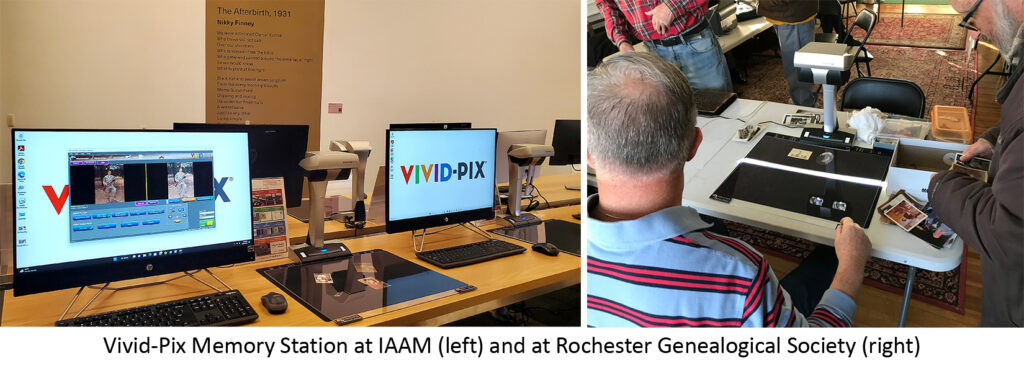The following is a press release from Vivid-Pix:
Vivid-Pix, President & CEO, Rick Voight to Speak at “What’s Next Longevity Innovation Summit” in Washington, DC on December 13
Memory Station One-click Scanning Solution Is Designed Easy-to-Use for Older Adults to Help Them Save Precious Image, Artifact and Voice Memories for Future Generations
December 7, 2023, Savannah, GA – Vivid-Pix www.vivid-pix.com, a technology leader specializing in scanning, restoring, and archiving treasured memories, announced today that the Memory Station™ one-click scanning solution designed for older adults to scan, restore, and record audio memories and save multiple images, documents, and memorabilia for future generations is being deployed throughout the U.S., expanding into senior living, home healthcare, genealogical and historical societies, archives, and museums, where seniors can enjoy reliving their memories.

Vivid-Pix is now available for use at:
- Senior Living: Cloverwood Friendly Senior Living, the #1 Nursing Home in NY state. Cloverwood is a full-service independent living community located in Pittsford, NY which opened in 2004 as an active, friendly senior living community with a rich selection of programs and activities.
- Home Healthcare: Thrive Center, a technology testing location for National Institute of Health (NIH). A unique consortium of people and ideas unlike anything in the world, Thrive is a collaborative group of innovators, researchers, and healthcare providers from across the US who are focused on solving challenges and providing solutions for the aging care market.
- Societies: National Genealogical Society, California Genealogical Society, South Carolina Historical Society, and Rochester Genealogical Society.
- Libraries: Allen County Public Library, Fort Wayne, IN, The Power of Story. The ACPL Genealogy Center explores unique state-of-the-art resources for family history research with the largest publicly available research collection in the country; making available, at no cost, records from around the world to aid in personal discovery.
- Archives: Houston County Archives and Tennessee Archives & Museum.
- Museums: International African American Museum, Charleston, SC. IAAM is the museum that honors the untold stories of the African American journey at one of our country’s most sacred sites.
In addition to the recent extensive travels throughout the U.S. showcasing Vivid-Pix Memory Station at various societies, libraries, and facilities, Rick Voight, President & CEO, Vivid-Pix will also be speaking at the “What’s Next Longevity Innovation Summit” in Washington, DC on December 13 at 8:00 AM with Matt Menashes, Executive Director, National Genealogical Society. For more information, and to schedule interviews, please contact: Karen Thomas, Thomas PR (631) 549-7575 kthomas@thomaspr.com.
Where: What’s Next Longevity Innovation Summit
What: “Successful Case Studies” Panel
Date: December 13, 2023 at 8:00 AM
Who: Matt Menashes, Executive Director, National Genealogical Society and
Rick Voight, President & CEO, Vivid-Pix
About: https://washingtoninnovationsummit.com/
Vivid-Pix Memory Station Availability
The Vivid-Pix Memory Station solution is available immediately at: https://www.vivid-pix.com/memorystation, priced at $629.95 – $1299.95. For more information, see: www.vivid-pix.com.
About Vivid-Pix
Vivid-Pix invents and harnesses technologies, making it simple for individuals and organizations to relive memories and share stories. Whether by inventing software to restore decades/centuries-old photos/documents, bringing back precious memories that were thought to be long gone due to the passage of time, cognitive decline, or helping to bring families and friends together at reunions, for over a decade Vivid-Pix has made it simple and affordable for consumers and organizations to relive memories. For more info, visit https://www.vivid-pix.com/.
Photos: https://drive.google.com/drive/folders/16UHfGOkp_tgqoFMmnQPf44DXgASEwDGV?usp=sharing
Vivid-Pix Logo: http://www.thomas-pr.com/136/photos/vividpixlogo.html
Memory Station How-to Video: https://vimeo.com/866954225/f7bd35929a
 Latest News Articles
Latest News Articles If you do not see a Plus Sign that is labeled "Add comment," you will need to upgrade to either a (FREE) Standard Edition or a (paid) Plus Edition subscription
If you do not see a Plus Sign that is labeled "Add comment," you will need to upgrade to either a (FREE) Standard Edition or a (paid) Plus Edition subscription